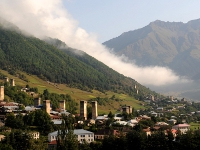{
"authors": [],
"type": "event",
"centerAffiliationAll": "dc",
"centers": [
"Carnegie Endowment for International Peace"
],
"collections": [],
"englishNewsletterAll": "",
"nonEnglishNewsletterAll": "",
"primaryCenter": "Carnegie Endowment for International Peace",
"programAffiliation": "russia",
"programs": [
"Russia and Eurasia"
],
"projects": [],
"regions": [
"Caucasus",
"Azerbaijan",
"Armenia",
"Georgia"
],
"topics": [
"Political Reform",
"Democracy",
"Economy"
]
}
The South Caucasus 20 Years After Independence
Mon, November 28th, 2011
Washington, D.C.
Twenty years after the end of the Soviet Union, the South Caucasus countries can no longer be considered “in transition.” Armenia, Azerbaijan, and Georgia have built functioning sovereign states. But many questions remain about how well they are faring compared to the democratic countries of the European Union or the rising economies of Asia.
Carnegie hosted a two-day conference to examine the lessons learned from twenty years of independence and state-building in Armenia, Azerbaijan, and Georgia and discuss the best paths of future development in the region. The conference brought together more than twenty non-governmental experts, academics, journalists, and civil society activists from the South Caucasus to discuss the evolution of human rights, economic reform, and the media, as well as the role of Western institutions in promoting democratization in the region.
Carnegie does not take institutional positions on public policy issues; the views represented herein are those of the author(s) and do not necessarily reflect the views of Carnegie, its staff, or its trustees.